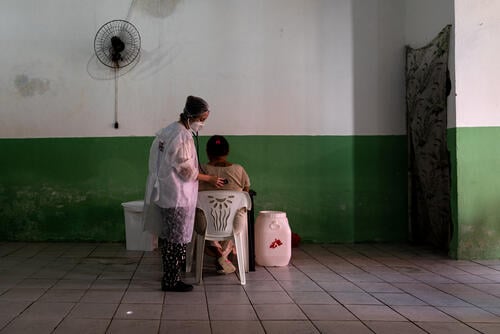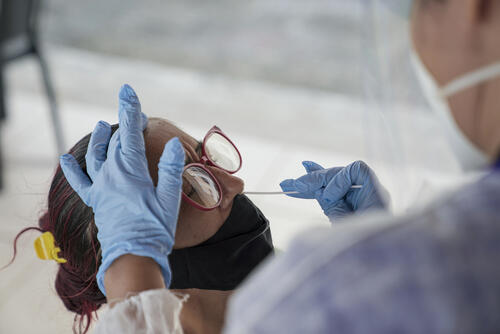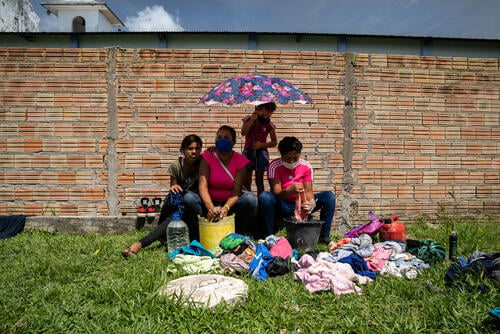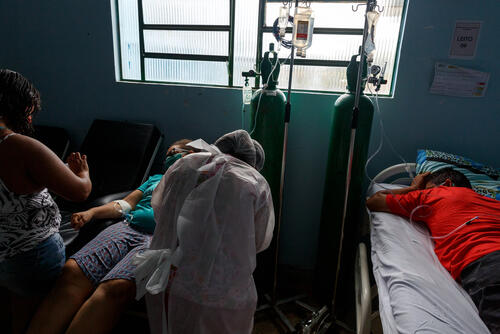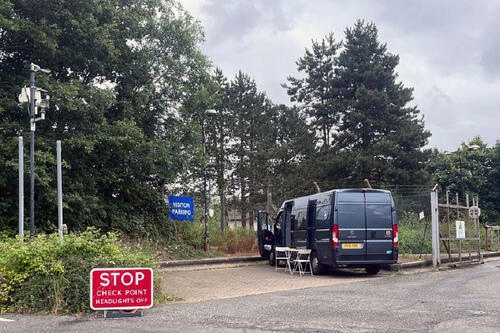As the weather gets colder in Brazil and the pandemic rolls on, the COVID-19 situation in the country has again become deeply concerning, with national and international experts warning of a third devastating wave.
The response remains fragmented and decentralised while the central authorities continue to disregard science, including the importance of masks and physical distancing, in their health messaging.
Sadly, Brazilians now account for over 500,000 COVID-19 deaths and the average COVID-19 fatality rate has crept above 2,000 people a day for the first time since May. Likewise, the number of new cases has also risen to more than 70,000 a day. This is the highest average since the peak of cases during the second wave in early May.
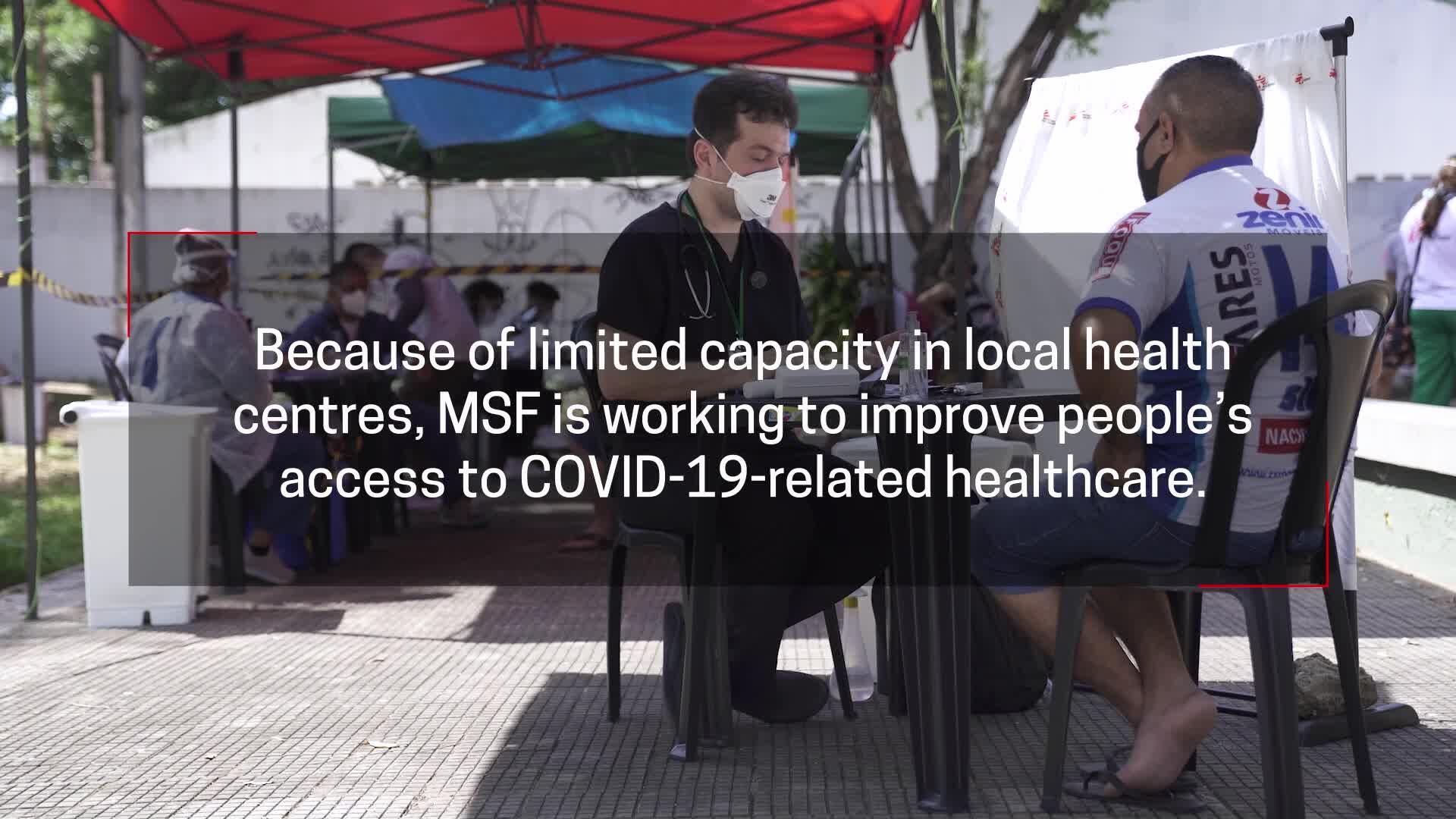
MSF provides medical care in Fortaleza
“In Brazil’s case, it is hard to say if we are starting a new wave because the truth is that there has never been a substantial drop in cases since the beginning of the pandemic,” says Antonio Flores, MSF infectious disease specialist.
He explains that what we have seen so far are cycles. After a peak, there is a moderate fall and then a stabilisation at a high plateau, before cases unfortunately start rising again.
“Throughout the pandemic Brazil has been in almost continuous danger of having an acceleration of cases and deaths,” says Flores.
The arrival of winter in Brazil now brings further complications. Usually, the cooler weather brings with it a rise in cases of the common flu and other respiratory diseases. As people become infected with these illnesses, a health system that is already under pressure due to COVID-19 will be further strained.
As the virus continues to spread, our teams across the country are finding new ways to help the most vulnerable communities in the most disadvantaged areas of Brazil, such as the remote north and northeast of the country, where access to health services is more difficult.
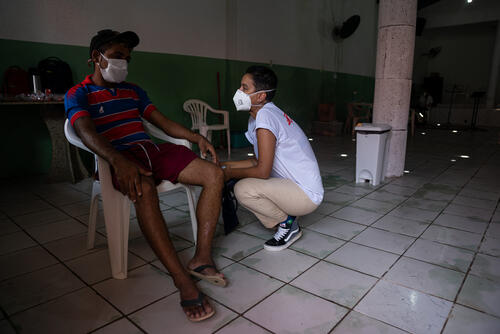
Supporting health facilities in Portel, Pará
On Ilha do Marajó (Marajo Island), we are supporting health authorities in the city of Portel, where, due to the extreme remoteness of the community and lack of infrastructure, the health system is struggling to face the COVID-19 pandemic.
Our teams have run trainings in clinics as well as the only hospital in the area to improve patient flow, COVID-19 protocols, health promotion messages and mental health amongst staff.
“Our objective is to reach Portel’s most vulnerable and provide them with the healthcare they need and to strengthen the health system,” says Juan Carlos Arteaga, MSF project coordinator in Portel. “We want local doctors and nurses to be prepared as much as possible for an influx of COVID-19 patients should the third wave hit the area.”
We are also running mobile clinics to care for patients in the most remote areas of the region, providing COVID-19 antigen testing, primary healthcare services, follow-up for recovered COVID-19 patients, mental health services and health promotion activities in the area.
Our objective is to reach Portel’s most vulnerable and provide them with the healthcare they need and to strengthen the health system.Juan Carlos Arteaga, MSF project coordinator
Limited access to healthcare in Fortaleza, Ceará
In the capital city of the state of Ceará, our staff are working in the communities of José Walter and Grande Bom Jardim, where people struggle to get the healthcare they need.
“In these communities, access to healthcare is notoriously difficult,” says Daniela Cerqueira Batista, MSF’s project coordinator in Fortaleza. “We are in constant communication with community leaders and they are really happy that we offer services that they really need.”
MSF’s two mobile clinics provide healthcare close to homes and aim to increase the number of high-quality services for the community. As in Portel, each day our teams conduct rapid antigen testing for COVID-19; at-home follow up for COVID-19 patients with comorbidities; mental health services; support the COVID-19 vaccination registration programme; and run health promotion activities.
We are also preparing a comprehensive medical response in the state of Paraiba.
Empowering local healthcare in Bahia
Our teams are also working in the cities of Cocos, Xique-Xique and Riachão das Neves, while closely monitoring the COVID-19 situation in other municipalities. Our teams are supporting the municipal health secretariat’s facilities to get them ready for the expected third wave.
Our medical staff are conducting training to improve COVID-19 protocols and patient flow, along with mental health services for the staff working in those units. As in other areas of the country, COVID-19 has taken a terrible toll on the mental health of those who care for the most severely affected patients and who deal with high numbers of deaths.
In order to build capacity in the fight against COVID-19, we are implementing a decentralised testing policy with antigen rapid testing and at-home follow up of high-risk patients in order to facilitate the quick initiation of oxygen therapy.
“We want to empower the local health system so that they can give patients the highest quality of care possible,” says Fabio Biolchini, MSF head of mission in Brazil. “We are also supporting local authorities to deliver accurate health promotion messages to the communities, using science to explain how they can best take care of themselves and avoid the huge amount of misinformation in the community.”
We want to empower the local health system so that they can give patients the highest quality of care possible.Fabio Biolchini, MSF head of mission in Brazil
Meanwhile, the fate of the pandemic remains uncertain in Brazil due to the lack of a centralised and coordinated response, which has clearly compromised efforts to fight the disease.
“This lack of coordination and strategic action by the authorities is reflected in the absence of a sustained control of the epidemic,” says Flores. “The virus has always been circulating freely.”



